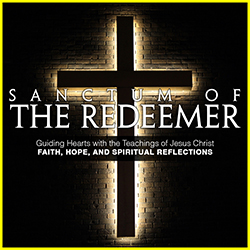
Welcome to spring’s call for inner renewal, a testament as a reminder that what lies dormant can flourish again. Here, in this sacred intersection between the solemn reflections of Lent and the jubilant echoes of Resurrection, we are invited to revisit two essential disciplines of faith: forgiveness and compassion.
There is no more fitting time to contemplate healing, not as a passive experience of comfort but as an act of deliberate grace that draws its power from the redemptive mercy of Our Father. It is easy, perhaps even human, to hold onto grievances. Whether formed by betrayal, misunderstanding, or neglect, wounds can etch themselves into the very marrow of our memory. Yet when Jesus hung upon the Cross—nailed, mocked, deserted by those He came to save—His first words were not of accusation, but of intercession: “Father, forgive them; for they know not what they do” (Luke 23:34). It was not a conditional forgiveness. He did not wait for repentance. He extended grace amid the pain. Mercy was not spoken from a throne of glory but from a place of suffering—a sacred paradox that continues to shape our understanding of compassion.
Our Lord's words reinforce this divine model of forgiveness and the covenantal wisdom passed down through the generations. The Septuagint, echoing the voice of prophetic tradition, reminds us in Sirach 28:7, “Be not overcome with hatred toward thy neighbor, but remember the covenant of the Highest, and overlook ignorance.” To harbor resentment is to forget the nature of our covenant with Our Lord and Creator—one founded not upon the merit of the forgiven but upon the mercy of the Forgiver. Compassion is not given because it is earned but because we are commanded to mirror the character of Our Father, who is “full of compassion, and gracious, longsuffering, and plenteous in mercy and truth” (Psalm 86:15).
True healing begins when we reframe the act of forgiveness not as the erasure of wrongdoing but as a path toward freedom. It is the willful surrender of our claim to vengeance and the quiet resistance against bitterness. Jesus teaches that, “Therefore if thou bring thy gift to the altar, and there rememberest that thy brother hath ought against thee; Leave there thy gift before the altar, and go thy way; first be reconciled to thy brother, and then come and offer thy gift” (Matthew 5:23–24). This command challenges the pious, who would worship while withholding mercy. It declares that worship cannot ascend where unforgiveness resides.
To begin your healing, to break the power of silence and allow grace to enter where pride once stood, say, “I forgive you. Not because it’s easy or because it’s forgotten. But because I cannot carry this weight anymore.”
Forgiveness is not the absence of justice, nor does it erase the consequences of sin. Justice is about setting things right, while forgiveness is about releasing the hold of the past on our present and future. But it liberates the soul from captivity to pain. And where compassion is present, healing follows. The Apostle Paul exhorts believers to “restore him in a spirit of gentleness. Keep watch on yourself, lest you too be tempted” (Galatians 6:1). Here lies the truth: we do not forgive because we are better than others but because we know we, too, need mercy. We Forgive to reflect the character of Our Lord and Saviour; when we withhold it, we obscure His image. To live without compassion is to forget the cost at Calvary.
Today, let this be a time to reflect, release, and renew. Think of someone whose offense still echoes in your heart. Choose the path of Our Lord. Choose the freedom that comes when we forgive, not because they deserve it but because we are no longer willing to carry the burden. Consider contacting them or writing a letter to express your forgiveness. Remember, forgiveness is not a one-time event, but a continual choice we make to let go of the burden of resentment.
As we close, may we choose the gentle restoration of the wounded heart. May our prayers be offered not just with words but with deeds that reflect the mercy we have received. May our lives bear witness to this enduring truth: healing comes not only through time but through grace.
Share the Blessing
Thank you for spending time with us in reflection today. By recognizing Our Lord's hand in all things, both the blessings and the challenges, we can grow in faith and live with a heart full of thankfulness. If this devotional has blessed you, we encourage you to share it with others needing rest and peace. Let's continue to support one another in our pursuit of spiritual renewal by spreading the message of His peace.
We also welcome your thoughts and prayer requests as we continue to build a community centered around faith, love, and purpose. You can read our devotionals for free on our website or receive them directly in your inbox by joining our member-supported version on Sanctum of the Redeemer on Substack. To support our ministry, consider contributing to the Sanctum of the Redeemer to continue bringing spiritual nourishment to our community.
Together, let us journey toward deeper reflection and rest in Our Lord. May you walk in wisdom and light, always guided by His truth. In Jesus' name, Our Lord and Saviour.

